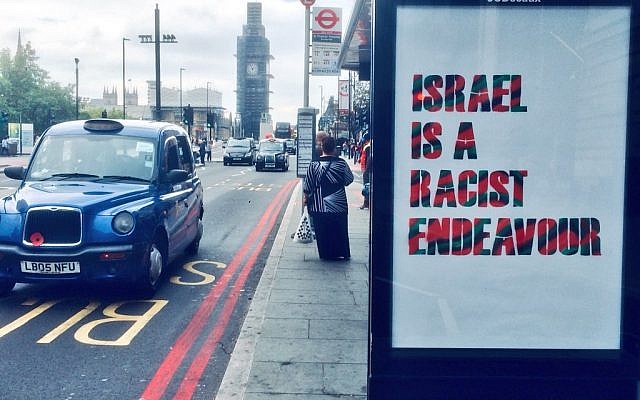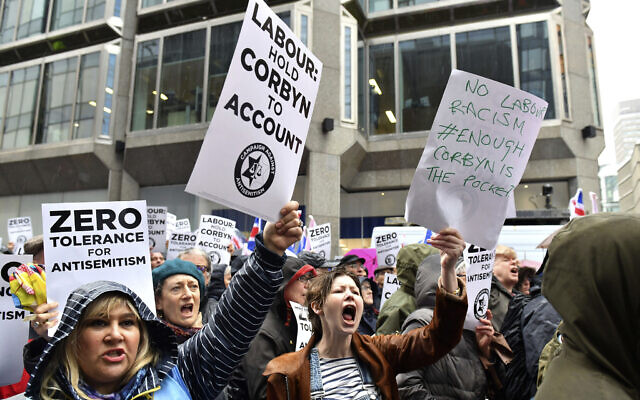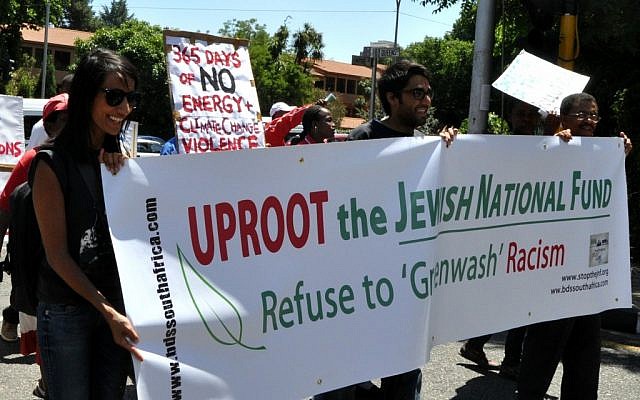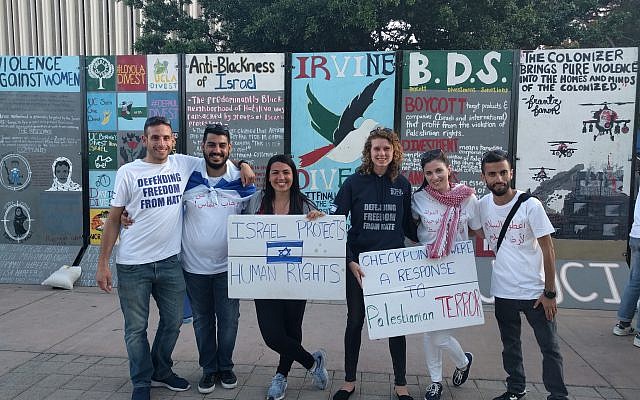JTA — When is it anti-Semitic to criticize Israel?
Anti-Semitism signifies hatred of Jews and the ways that hatred is perpetuated through age-old conspiracy theories and their modern variants. But what about when that hatred is expressed through rhetoric about the Jewish state? Is anti-Zionism anti-Semitism?
Those questions have divided American Jews in recent years — and are continuing to do so, as of last week.
Establishment Jewish groups want US President-elect Joe Biden’s administration to treat some anti-Israel speech as anti-Semitism. Progressive Jewish groups disagree, worried about chilling or criminalizing legitimate criticism of Israeli policy.
At the center of the debate is a 500-word “working definition” of anti-Semitism, published in 2016 by the International Holocaust Remembrance Alliance, or IHRA. That definition seeks to provide a guide to which statements or actions qualify as anti-Semitism.
It ranges from stereotypes about Jews to incitement of violence to Holocaust denial. A growing list of countries, international agencies, universities and sports teams have adopted the definition in an effort to help them recognize Jew-hatred.

US President Donald Trump signs an executive order combating anti-Semitism in the US during a Hanukkah reception in the East Room of the White House in Washington, December 11, 2019. (Manuel Balce Ceneta/AP)
But its provisions on rhetoric around Israel have sparked contentious debate, which was heightened in 2019 when US President Donald Trump signed an executive order essentially adopting the working definition as a reference for adjudicating civil rights complaints on campus. This debate has continued even as the IHRA has emphasized that the definition is not legally binding.
Here’s what the IHRA definition says, why its supporters see it as a key for fighting Jew-hatred and why its critics are fighting it.
The definition is an effort to describe an age-old hatred.
The International Holocaust Remembrance Alliance is an international network of academics, museum heads and nonprofit leaders from 34 countries that promotes Holocaust research and education.
In 2016, facing rising anti-Semitism around the world, the alliance drafted a definition of anti-Semitism that was aimed at helping countries, institutions and organizations recognize when it was taking place, and monitor and record it. The IHRA definition was based on an earlier one formulated in 2005 by a European Union agency.
The later effort was prompted by “a surge in anti-Semitic incidents in Western Europe, with attacks on Jewish targets including schools and synagogues,” according to a pamphlet published by the American Jewish Committee advocating for the working definition. “Governments were slow to recognize them, let alone respond to them.”

French soldiers patrol on January 21, 2015, in front of a synagogue in Neuilly-sur-Seine, outside Paris, as part of France’s national security alert system Vigipirate. (Kenzo Tribouillard/AFP/Getty Images)
The document aims to help countries do that and covers a range of different ways that hatred of Jews can manifest.
According to the definition, anti-Semitism “is a certain perception of Jews, which may be expressed as hatred toward Jews,” and that anti-Semitism could take physical or rhetorical form and be directed at Jews as well as non-Jews, in addition to property and institutions.
The document lists 11 ways that anti-Semitism could take shape. They include calling for Jews to be killed, advancing enduring Jewish stereotypes about conspiracy and control, blaming Jews as a group for the actions of individuals or various forms of denying the Holocaust.

Illustrative: A London bus stop defaced with an unauthorized poster reading, ‘Israel is a racist endeavor,’ which a pro-Palestinian group put up in protest at the UK Labour Party’s adoption of the IHRA definition of anti-Semitism, on September 6, 2018. (Twitter)
Six of the 11 examples have to do principally with certain kinds of rhetoric around Israel. They include:
- Accusing Jews of being more loyal to Israel or to a global Jewish agenda than to their home countries.
- Denying Jews the right to self-determination or calling Israel a “racist endeavor.”
- Applying a double standard to Israel that isn’t applied to other countries.
- Applying classic anti-Semitic smears, like the blood libel, to Israel.
- Comparing Israel to the Nazis.
- Holding Jews collectively responsible for Israel’s actions.
The definition says anti-Semitism “frequently charges Jews with conspiring to harm humanity, and it is often used to blame Jews for ‘why things go wrong.’”
It is increasingly being seen as the guidebook for fighting anti-Semitism across the globe.
Since it was drafted, the working definition has gained currency in a growing number of nations and organizations. To date, 28 countries — mostly in Europe — have adopted the definition to help them determine what constitutes anti-Semitism.
In December, the Council of the European Union invited the bloc’s 27 member states to adopt the definition. Various other pan-European bodies have endorsed it as well, and in 2018 UN Secretary-General Antonio Guterres said the definition can “can serve as a basis for law enforcement, as well as preventive policies.”

Screen capture from video of UN Secretary-General António Guterres addressing the General Assembly Hall as the UN marked International Holocaust Memorial Day, January 31, 2018. (YouTube)
Some nongovernmental institutions — such as universities, soccer teams and, recently, an international Muslim clerical council — have also adopted the definition as a way to identify anti-Semitism. Last year, 145 Jewish and pro-Israel organizations wrote a letter to Facebook encouraging the platform to use the definition “as the cornerstone of Facebook’s hate speech policy regarding antisemitism.”
The US State Department uses a similar definition of anti-Semitism, which it adopted in 2010. Former president George W. Bush’s State Department had endorsed the definition’s predecessor in 2007 as an “adequate initial guide” to anti-Semitism.
The Trump administration was even more reliant on the definition. Last year, an executive order by Trump instructed the Executive Branch to consider the IHRA definition, including its 11 examples, when investigating civil rights complaints — including those filed to the Department of Education’s Office of Civil Rights regarding alleged discrimination on campus.

Illustrative: The Conference of Presidents’ Malcolm Hoenlein (L), Arthur Stark (C) and William Daroff at a press conference in Jerusalem, February 16, 2020 (Avi Hayoun)
On January 12, the Conference of Presidents of Major American Jewish Organizations, a coalition of establishment Jewish groups, sent a letter to Biden asking him to adopt Trump’s policy regarding the IHRA definition.
“We believe that all federal departments and agencies should, in their work, consider the IHRA working definition of antisemitism (with examples),” says the letter, which was first reported on by Jewish Insider. “We urge your administration to maintain and build upon these policies of the last three presidents.”
Critics, especially Palestinians and their advocates, say the IHRA definition inhibits free speech.
As adoption of the IHRA definition has spread, so have protests against it from coalitions of activists and academics.
The definition’s opponents say its clauses on Israel will have a chilling effect on debate around the Israeli-Palestinian conflict. They worry that in condemning some forms of anti-Israel speech, the definition will serve to label all critics of Israel, or pro-Palestinian activists, as anti-Semites.

Illustrative: anti-Israel students at Columbia University erect a mock ‘apartheid wall’ in front of the iconic Low Library steps during Israel Apartheid Week, March 3, 2016. (Uriel Heilman)
“The effort to combat antisemitism is being misused and exploited to instead suppress legitimate free speech, criticism of Israeli government actions, and advocacy for Palestinian rights,” reads a statement opposing adoption of the IHRA definition made January 12 by a coalition of American Jewish organizations with progressive positions on Israel.
Palestinians have said that the Israel provisions, including the one that bans calling Israel racist, serve to make Israel immune to criticism for its treatment of Palestinians and for what they view as its violation of international law.
“To level the charge of antisemitism against anyone who regards the existing state of Israel as racist, notwithstanding the actual institutional and constitutional discrimination upon which it is based, amounts to granting Israel absolute impunity,” a group of 122 Palestinian academics and writers wrote in The Guardian. “The IHRA definition and the way it has been deployed prohibit any discussion of the Israeli state as based on ethno-religious discrimination.”

Illustrative: Protesters chant slogans during a demonstration organized by the Campaign Against Antisemitism against alleged prejudice in the Labour Party, amid a row over the party’s handling of claims of anti-Semitism, outside the Labour Party headquarters, in London, Sunday April 8, 2018. (Dominic Lipinski/PA via AP)
In 2018, British Jews slammed the country’s Labour Party for adopting the definition but initially refusing to include several of the Israel-related provisions. At the time, the party was embroiled in controversy over mounting allegations of anti-Semitism against its officials and particularly its leader, Jeremy Corbyn, a longtime harsh critic of Israel.
Debate over the definition has flared again in the United Kingdom after the country’s education secretary instructed universities to adopt the definition. While Oxford and Cambridge have adopted the definition in recent weeks, according to The Guardian, a letter published by eight prominent British lawyers last week argues against adopting the definition.
Defenders point to the definition’s nuance on Israel and support for free speech.
The definition’s advocates say the definition distinguishes between legitimate criticism of Israel and instances where rhetoric either crosses the line into anti-Semitism or uses critique of the Jewish state as a front for hatred of Jews.
The definition makes clear that “criticism of Israel similar to that leveled against any other country cannot be regarded as antisemitic.”

Illustrative image of an anti-Israel rally in Johannesburg in 2011. (photo credit: CC BY Meraj Chhaya, Flickr)
The AJC pamphlet says the definition concerns itself only with “where and how anti-Israel animus can become a form of anti-Semitism, separate and apart from criticism of Israel,” and that “its careful wording leaves a wide berth for sharp and vigorous criticism of Israel’s government and policies.”
What’s more, the definition itself states that it is “non-legally binding,” and in introductions to the brochure, officials stress that point to argue that the definition should not be an obstacle to free speech.
“Non-legally binding in its nature, the working definition is helpful in public discourse as well as training for media, educators and public authorities, without impeding the legal right to freedom of speech,” writes Katharina von Schnurbein, European Commission coordinator on combating anti-Semitism.
What was supposed to be a helpful guide has become a instrument of division.
The irony in all this is that the definition was supposed to help resolve debates over what constitutes anti-Semitism, not start them. But the definition has become divisive as activists have sought to give it the force of law — something that, according to one of the definition’s authors, was never supposed to happen.
“It was never intended to be a campus hate speech code,” Kenneth Stern, director of the Center for the Study of Hate at Bard College, wrote in a 2019 Guardian op-ed opposing Trump’s executive order.

Illustrative: Activists from the group Reservists on Duty, in t-shirts reading ‘Defending freedom from hate,’ counter protest in front of Boycott, Divestment and Sanction display on a college campus. (Courtesy Reservists on Duty)
Stern added that he fears right-wing pro-Israel groups “will hunt political speech with which they disagree, and threaten to bring legal cases. I’m worried administrators will now have a strong motivation to suppress, or at least condemn, political speech for fear of litigation.”
Some pro-Israel advocates have also sought to widen the definition’s scope. In a New York Times op-ed about Trump’s executive order, White House senior adviser Jared Kushner appeared to interpret the IHRA definition more expansively.
Kushner, Trump’s son-in-law, wrote that the definition “makes clear” that “Anti-Zionism is anti-Semitism” — though the word “Zionism” does not appear in the definition itself. In employing the definition, he wrote, the executive order prevented students from harassing Jews under the guise of criticizing Israel.

Jared Kushner speaks next to US National Security Adviser Robert O’Brien (R) in front of an El Al plane at the Abu Dhabi airport, following the arrival of the the first-ever Israeli flight to the UAE, on August 31, 2020. (KARIM SAHIB / AFP)
“It has become fashionable among Jew haters to characterize any discriminatory behavior — no matter how loathsome — not as criticism of Jews, but of Israel,” he wrote. “This is a lie. Especially on college campuses, where discrimination, harassment and intimidation of Jewish students has become commonplace and is routinely, but wrongly, justified.”
All of this debate is now associated with the definition. That’s why the question of whether the US should keep using it as its framework for identifying anti-Semitism has become one of the first open disputes among American Jews regarding the Biden administration.
 RSS Feed
RSS Feed















 January 20th, 2021
January 20th, 2021  Awake Goy
Awake Goy  Posted in
Posted in  Tags:
Tags: 













